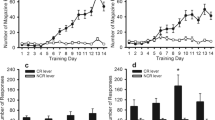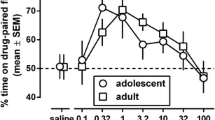Abstract
Initial responsiveness to morphine was studied in two inbred strains of mice, C57BL/6J and DBA/2J, and their F1 hybrid, using both a hot-plate analgesia test and a locomotor-activity test. Three dose levels of morphine were used, 0 mg/kg, 5 mg/kg, and 15 mg/kg. The inclusion of the 0 mg/kg group revealed differences between the inbred strains in the effects of test experience. These data also led to some new conclusions about the differences in responsiveness to morphine between the strains studied. On both tests, the DBA mice showed no effect of morphine, the C57 mice showed large effects, and the F1 mice showed an intermediate effect.
Similar content being viewed by others
References
Adams, W. J., Yeh, S. Y., Woods, L. A., Mitchell, C. L.: Drugtest interaction as a factor in the development of tolerance to the analgesic effect of morphine. J. Pharmacol. Exp. Ther.168, 251–257 (1969)
Eddy, N. B., Leimbach, D.: Synthetic analgesics. II. Dithienyl-butenyl and dithienylbutylamines. J. Pharmacol. Exp. Ther.107, 385–393 (1953)
Eidelberg, E., Erspamer, R., Kreinick, C. J., Harris, J.: Genetically determined differences in the effects of morphine on mice. Eur. J. Pharmacol.32, 329–336 (1975)
Gebhart, G. F., Mitchell, C. L.: Strain differences in the analgesic response to morphine as measured on the hot plate. Arch. Int. Pharmacodyn. Ther.201, 128–140 (1973)
Goldstein, A., Sheehan, P.: Tolerance to opiad narcotics. I. Tolerance to the running fit caused by levorphanol in the mouse. J. Pharmacol. Exp. Ther.169, 175–184 (1969)
Kayan, S., Woods, L. A., Mitchell, C. L.: Experience as a factor in the development of tolerance to the analgesic effect of morphine. Eur. J. Pharmacol.6, 333–339 (1969)
Oliverio, A., Castellano, C.: Genotype-dependent sensitivity and tolerance to morphine and heroine: dissociation between opiate induced running and analgesia in the mouse. Psychopharmacologia (Berl.)39, 13–22 (1974a)
Oliverio, A., Castellano, C.: Experience modifies morphine-induced behavioral excitation of mice. Nature252, 229–230 (1974b)
Oliverio, A., Castellano, C., Eleftheriou, B. E.: Morphine sensitivity and tolerance: a genetic investigation in the mouse. Psychopharmacologia (Berl.)42, 219–224 (1975)
Shuster, L., Webster, G. W., Yu, G.: Increased running response to morphine in morphine-pretreated mice. J. Pharmacol. Exp. Ther.192, 64–72 (1975a)
Shuster, L., Webster, G. W., Yu, G., Eleftheriou, B. E.: A genetic analysis of the response to morphine in mice: analgesia and running. Psychopharmacologia (Berl.)42, 249–254 (1975b)
Siegel, S.: Evidence from rats that morphine tolerance is a learned response. J. Comp. Physiol. Psychol.89 498–506 (1975)
Author information
Authors and Affiliations
Rights and permissions
About this article
Cite this article
Collins, R.L., Whitney, G. Genotype and test experience determine responsiveness to morphine. Psychopharmacology 56, 57–60 (1978). https://doi.org/10.1007/BF00571409
Received:
Accepted:
Issue Date:
DOI: https://doi.org/10.1007/BF00571409




